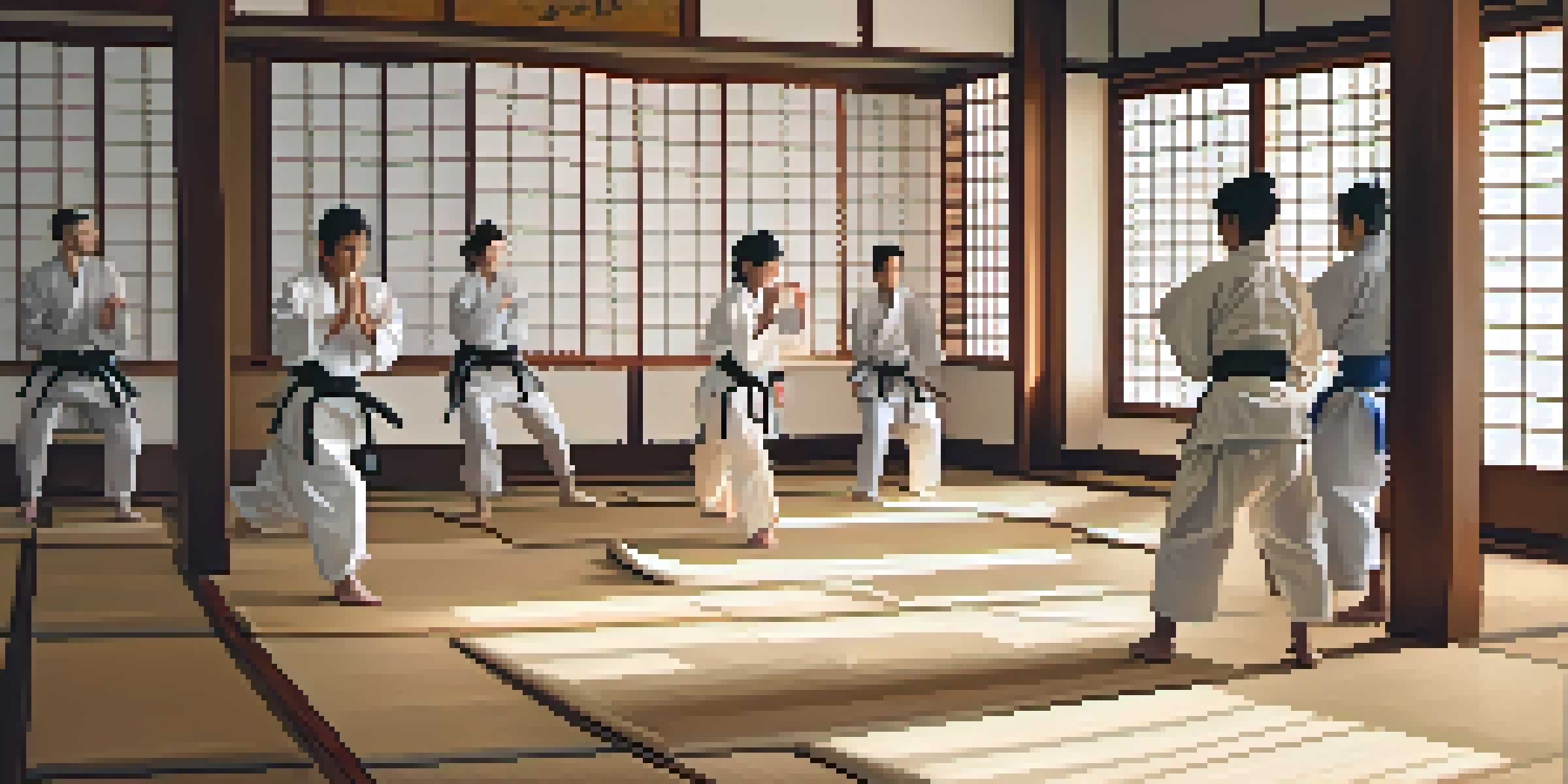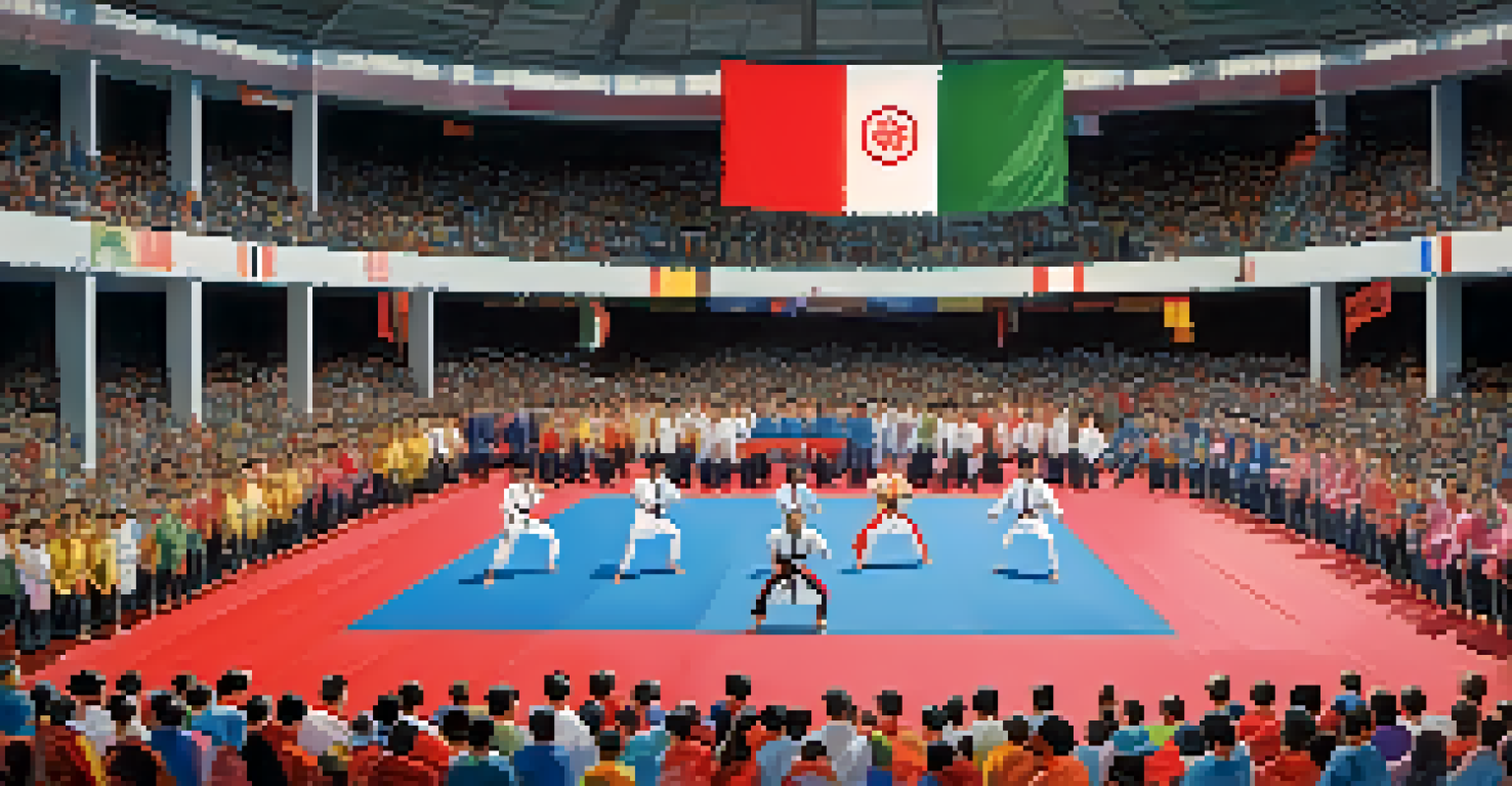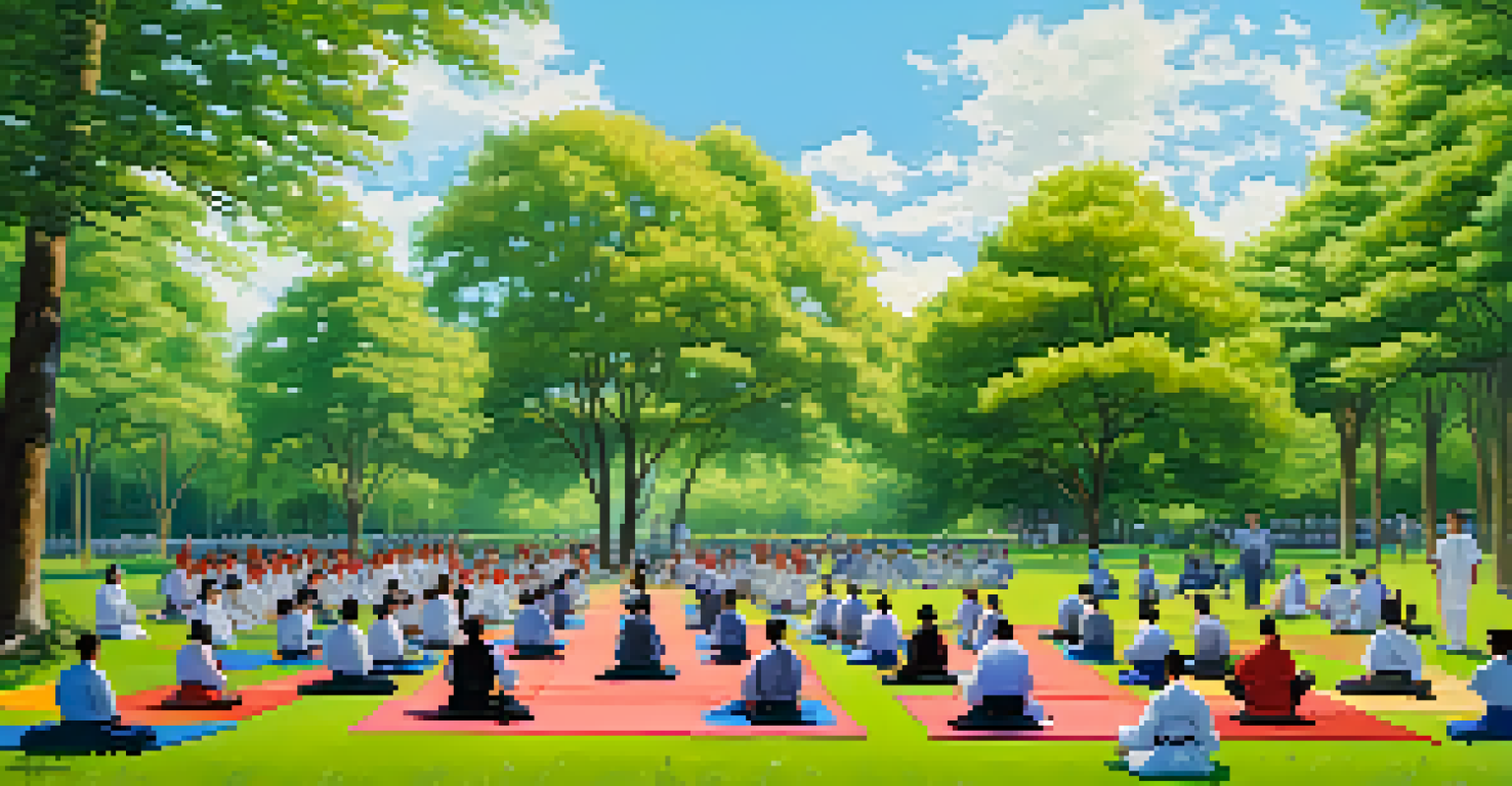The Role of Martial Arts in Soft Power Diplomacy

Understanding Soft Power and Its Importance
Soft power, a term coined by Joseph Nye, refers to the ability to influence others through attraction rather than coercion. Unlike hard power, which relies on military might, soft power focuses on cultural exchange, values, and diplomacy. The concept underscores the importance of non-verbal communication and relationships in international relations.
Soft power is the ability to attract and co-opt rather than coerce, using persuasion and influence.
In today’s interconnected world, countries are increasingly recognizing the value of soft power. It allows nations to foster goodwill and enhance their global image without the need for force. This approach not only builds alliances but also promotes mutual understanding among diverse cultures.
Martial arts, with their rich traditions and philosophies, serve as an effective medium for soft power. They encapsulate values such as discipline, respect, and perseverance, which resonate universally and can bridge cultural divides.
Martial Arts as a Cultural Bridge
Martial arts are more than just physical combat techniques; they are a manifestation of cultural identity. Practices like karate, judo, and taekwondo carry historical significance that reflects the ethos of their respective countries. Through these disciplines, nations can share their cultural narratives on a global stage.

When countries host martial arts events or competitions, they invite participants from various backgrounds, fostering international camaraderie. These gatherings often culminate in cultural exchanges that deepen understanding and appreciation of different traditions. For instance, the World Taekwondo Championships not only showcase athletic prowess but also promote cultural dialogue.
Soft Power Enhances Global Relations
Soft power, focusing on cultural exchange and diplomacy, allows nations to build goodwill and mutual understanding without the use of force.
Furthermore, martial arts schools around the world often teach students about the history and philosophy behind their practices, encouraging a broader understanding of the originating cultures. This educational aspect of martial arts acts as a conduit for cultural diplomacy, making it a valuable tool in soft power strategies.
Case Studies: Countries Using Martial Arts Diplomatically
Several nations have successfully leveraged martial arts as a diplomatic tool. For example, South Korea has utilized taekwondo to promote its culture globally, even including it in international sporting events like the Olympics. This strategic approach not only elevates the sport but also enhances Korea's soft power by showcasing its cultural heritage.
Martial arts is not about fighting; it’s about how to handle yourself, how to be a better person.
Another example is Japan, which employs judo as a means to foster international relations. Through exchanges and training programs, Japan has been able to build rapport with various nations, strengthening ties while promoting peace and understanding. Such initiatives often lead to long-lasting friendships and collaborations.
These case studies illustrate how martial arts can effectively facilitate dialogue and cooperation between nations. By embracing their martial arts traditions, countries can navigate complex geopolitical landscapes with grace and resilience.
The Impact of Martial Arts in Global Events
Global events such as the Olympics and World Martial Arts Games serve as platforms for cultural diplomacy. By participating in these events, countries can showcase not only their martial arts prowess but also their cultural values and traditions. The shared experiences foster a sense of unity and collaboration among nations.
During these events, athletes often engage in cultural exchange, participating in workshops and demonstrations that highlight their respective martial arts. This interaction builds personal connections, breaking down barriers and fostering mutual respect among competitors. Such experiences often transcend competition, creating friendships that last long after the events conclude.
Martial Arts Foster Cultural Exchange
Martial arts serve as a cultural bridge, promoting shared values and understanding through international events and training programs.
Moreover, the visibility of martial arts in such prestigious settings enhances a nation’s soft power. It showcases their commitment to peace, discipline, and respect for others, reinforcing positive perceptions across the globe.
Martial Arts as a Tool for Peacebuilding
Martial arts can play a significant role in peacebuilding initiatives. Through training and workshops, practitioners often learn conflict resolution skills, which are vital in promoting peace. These skills can be applied in various contexts, from community disputes to international conflicts.
Programs that integrate martial arts into peacebuilding efforts have been implemented in various regions, particularly in areas affected by violence. These programs not only empower individuals but also promote dialogue and understanding among conflicting parties. By focusing on shared values, martial arts can help heal divisions and foster reconciliation.
The transformative power of martial arts in these settings demonstrates its potential to cultivate peace. By teaching respect, empathy, and self-control, martial arts can contribute to building a more harmonious society, making it an essential tool in soft power diplomacy.
Challenges and Criticisms of Martial Arts Diplomacy
While the use of martial arts in diplomacy has many benefits, it is not without its challenges. One significant issue is the potential for cultural appropriation, where elements of a culture are taken without understanding or respect. This can lead to misinterpretations and reinforce stereotypes, undermining the very objectives of soft power.
Additionally, the commercialization of martial arts can dilute their cultural significance. As martial arts become more mainstream, there is a risk that their rich traditions may be overshadowed by profit-driven motives. This shift can detract from the values that martial arts are meant to promote, such as humility and respect.
Challenges in Martial Arts Diplomacy
Despite its benefits, martial arts diplomacy faces challenges like cultural appropriation and commercialization that can undermine its effectiveness.
Addressing these challenges requires a conscious effort from practitioners and nations alike. By prioritizing authenticity and cultural integrity, the potential for martial arts to serve as a genuine tool for soft power diplomacy can be realized.
The Future of Martial Arts in Soft Power Strategies
As the world becomes increasingly interconnected, the role of martial arts in soft power diplomacy is likely to grow. Nations may continue to explore innovative ways to incorporate their martial arts traditions into their diplomatic strategies, enhancing cultural exchange and international collaboration. The rise of social media and digital platforms will also play a pivotal role in this evolution.
Future collaborations could include virtual training sessions, online competitions, and cross-cultural exchanges that transcend geographical boundaries. These initiatives can foster a sense of global community while promoting the values inherent in martial arts. By adapting to the digital age, martial arts can reach a broader audience and reinforce their significance in global diplomacy.

Ultimately, the future of martial arts in soft power diplomacy hinges on the commitment of nations to embrace cultural exchange. By recognizing the potential of martial arts to foster understanding and cooperation, countries can leverage this powerful tool to navigate the complexities of our world.